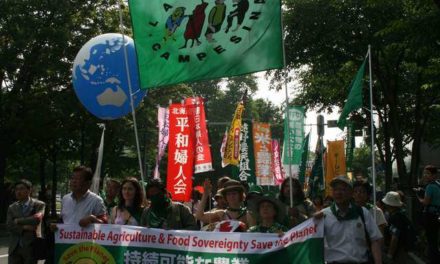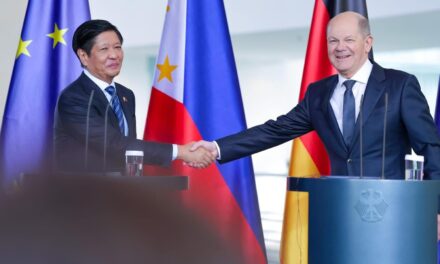The first phase of agricultural negotiations which had lasted a year concluded at the end of March with the Agriculture Special Session on March 22-23. This was followed immediately by a stocktaking session which was intended to set the work programme for the second phase of agriculture negotiations.
Many developing countries later expressed disappointment over this stocktaking process. They were also infuriated at attempts by the EU and Japan to elevate non-trade concerns and to put these on par in terms of importance and priority as ‘Special and Differential Treatment’ (S and D) for developing countries.
The most encouraging trend in this last Agriculture Special Session of Phase One of negotiations was the proliferation of papers submitted by developing countries, particularly from the African region. These came in the form of individual country proposals, as well as a common African position paper on agriculture.
However, despite developing countries’ active participation in submitting proposals in the negotiations in the first phase, the majority found themselves and their concerns marginalized in the agenda-setting for the next phase.
PROBLEMS WITH PROCESS
The stocktaking officially took place on Monday morning, the 26th March. Instead of utilizing fully the two days that had been set-aside for it, the process took only one morning, with the one-page work programme for Phase Two adopted in half an hour at the close of the morning. There was clearly, therefore, no real discussion on the work programme.
While the majority of countries had not been consulted, a small group had been involved in informal Green Room-type consultations beforehand. Those present included the key developed countries as well as a handful of developing countries.
This is an unfortunate and clear example of how the lack of internal transparency at the WTO penalizes developing countries, despite these delegations’ active participation. It also shows the extent to which the system has not changed since the collapse of the Seattle Ministerial, where absolute lack of internal transparency was a key contributory factor to the outcome of the Ministerial.
Two days, March 26 and 27 were originally set aside for the stocktaking to plan the programme on how to proceed on negotiations this year. However, on Saturday, 24th (at an informal meeting), even before the two-day stocktaking meeting could commence, many developing country delegates were surprised to be presented with a ready-made one-page work programme for Phase Two. Most developing countries including active delegations such as Pakistan, Dominican Republic, Sri Lanka and Cuba said that they had not been consulted.
Together, a couple of developing countries asked for a meeting with the Chairperson of the Special Session. They were able to make some changes, but this was severely limited, with the Chairperson saying that substantial changes would lead to the EU and Japan (in WTO circles seen as recalcitrant members subsidizing to an unreasonable extent their agricultural sector) stalling the entire process.
PROBLEMS WITH THE SUBSTANCE OF THE WORK PROGRAMME
The talk in the corridors here in Geneva is that members of the Cairns Group, particularly Argentina, in the informal consultations, wanted negotiations to move forward much more rapidly. They had suggested that work this year would lead to options, in bracketed texts, on the various aspects of the Agreement on Agriculture, which countries in their proposals in Phase one had given inputs on. This would set the stage for negotiations in the final phase. This proposal, however, was not supported by Japan and the EU (who have said that they would like to tie agriculture negotiations to the launch of a new round).
The final outcome is that Phase Two would be somewhat similar to Phase One in that Members will continue to submit proposals, except that discussions would take place according to topics and would presumably be more technically detailed than in Phase One. Ten issues had been listed for discussion for the first 2 to 3 meetings. These are: tariff quota administration, tariffs, amber box, export subsidies, state trading enterprises, export restrictions, food security, food safety, rural development
Many developing countries were unhappy on two counts. Firstly, the status of Special and Differential Treatment in the first draft of the Work Programme was marginalized. Although it was mentioned as a cross-cutting issue, it was put together with non-trade concerns, implying that these issues would be treated with the same amount of importance.
The argument presented to developing countries was that Article 20, which mandates that the review of the Agreement on Agriculture (AoA) mentions both food security and non-trade concerns. In response, developing countries made the point that indeed, that was the case, but that there was a special article in the AoA only on Special and Differential Treatment (Article 15) and therefore these issues were not of equal importance.
The compromise proposed was that S and D would be mentioned as one of the listed topics for discussion. That proposal was refused by developing countries, who pointed out that it would mean they would have to fight repeatedly when S and D was not on the agenda, to get some Special and Differential Treatment. In the end, developing countries’ position to have S and D as a stand-alone bullet point representing a cross-cutting issue for the work programme in Phase Two prevailed. The present wording in the work programme is that ‘Special and differential treatment is an integral part of all elements of the negotiations’.
However, many countries were very disappointed with the list of 10 topics. A group of ten to eleven developing countries had submitted joint proposals last year on the ‘Green Box’, critiquing the abuse of the Green Box by the US and EU, and on a ‘Development Box’ felt that apart from ‘food security’, the other issues they were concerned with had not been listed, for example, Green Box, Development Box, Blue Box, Special Safeguards etc. They were not able to further push their agenda because of threats that EU and Japan would unravel the process.
Some developing country delegates later commented that it would have been more logical to follow the present structure of the agreement and deal with the issues according to that structure: Market access, Domestic Support and Export Subsidies. This would ensure that everyone’s issues would be dealt with.
Although it is stated that those ten issues would take up the first 2 or 3 meetings, and there were six meetings scheduled, some countries were not so certain that this would be the case. Issues set for one meeting could easily spill over to the next. Furthermore, three meetings scheduled for May, July and September would basically cover the time between now till the next WTO ministerial in Doha in November. If no further issues are covered by the third meeting, it would mean that many of the topics raised earlier by developing countries would not have been dealt with by the time of the Ministerial.
PLAGUED BY SECRETIVE, CLOSE-ENDED INFORMAL CONSULTATIONS
The internal transparency issue has become dormant since the middle of last year. Recently, it has been raised with respect to the preparations for Doha in the General Council. Here some developing countries made the point that they wanted informal consultations to be open-ended (i.e., these theoretically should be reported to General Council and decisions should only be taken in General Council), to which, they were assured that of course, that is how things are run at the WTO anyway.
The non-transparent and undemocratic proceedings at the March stocktaking to a large degree silenced developing countries despite their active participation in the preceding year. This episode highlights the fact that until and unless process issues are addressed, it will be a key element that will plague and subvert all attempts by developing countries to get any benefits from the multilateral trading system.
* Aileen Kwa is a research associate with Focus on the Global South, based in Geneva. [email protected]








